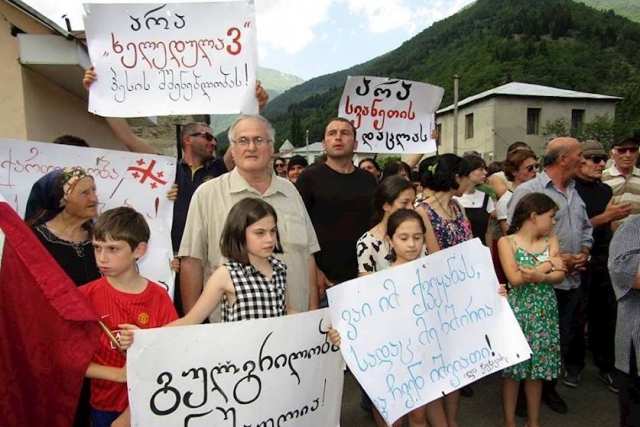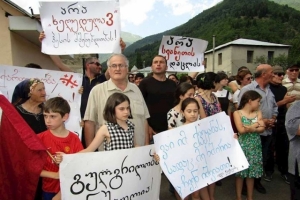Lentekhi Population Protests Construction of Kheledula-3 HPP
Citizens in Lentekhi have been protesting the construction of the Kheleldula-3 HPP, blocking access to the valley of heavy equipment belonging to company Kheledula Energyive. The company is said to have transferred the equipment to Tsageri. The reason why the local residents do not let the company build the HPP is that a 4km tunnel is to be built in the valley along the rivers Kheledula and Devashi.
“We will not let them build a HPP here. We have blocked the road and we will fight till the last drop of blood,” resident of Tsanash village, Raji Liparteliani, stated in an interview with 1TV.
The residents say they suspect the construction of the HPP will flood more than 200 family homes and pointed to the fact the area is a landslide zone and more than 600 people are in danger.
"We should understand that construction of the hydro power plants is directly related to the energy development of our country, and economic prosperity cannot be achieved without the development of the energy sector,” Deputy Minister of Economy and Sustainable Development of Georgia, Romeo Mikautadze stated at the meeting with the Lentekhi population. “Each HPP contributes to Georgia’s energy independence. Every new HPP means more electricity for our population, more investments and more employed citizens. The Georgian Government, me personally, will do our best to make it absolutely clear to our citizens.”
Construction of the Kheledula Hydro Power Plant 3 is being implemented in Georgia’s Racha-Lechkhumi-Kvemo Svaneti region, Lentekhi Municipality, over the River Kheledula.
According to the memorandum, the company is obliged to release part of the processed electricity onto the local market during the period when there is a power deficit (mostly during the winter months) in the country. The project contributes to the government’s long-term energy policy targeted at energy independence by utilizing all of the country’s natural resources.
Kheledula Hydro Power Plant 3’s capacity will be 50 MW, with an annual generation of approximately 250 million kilowatt-hours. The total investment cost of the project $80 million. Up to 400 people will be employed at various stages of the construction and the local population will make up the greatest part of the employees. After the HPP is operative, it will generate property tax of up to 1.5 million GEL for the local budget.
By Mariam Kukhilava












